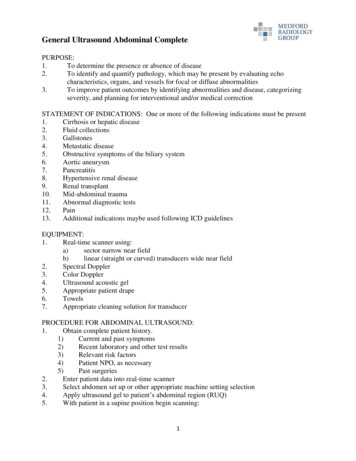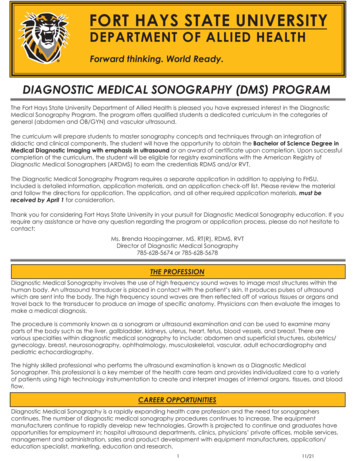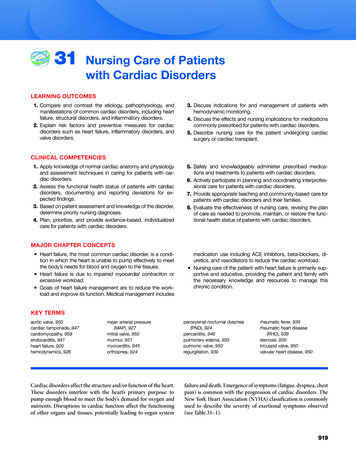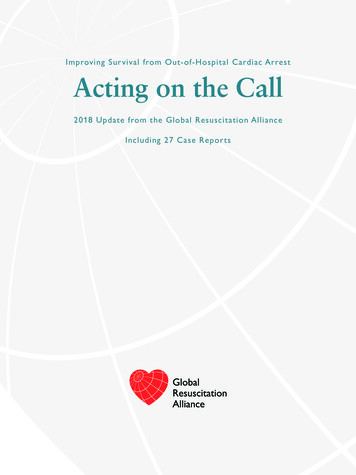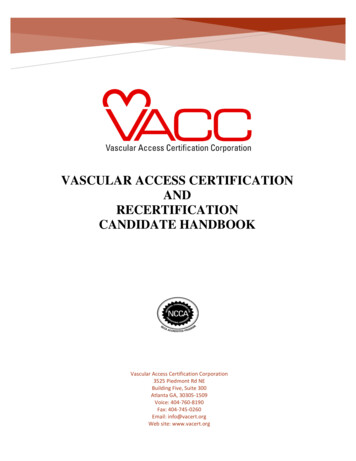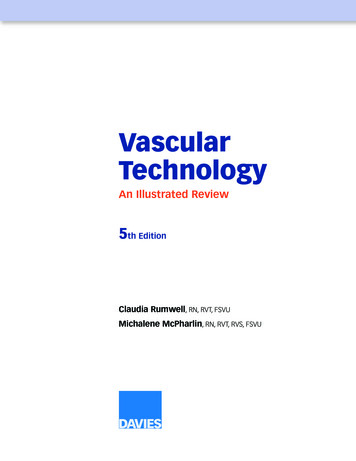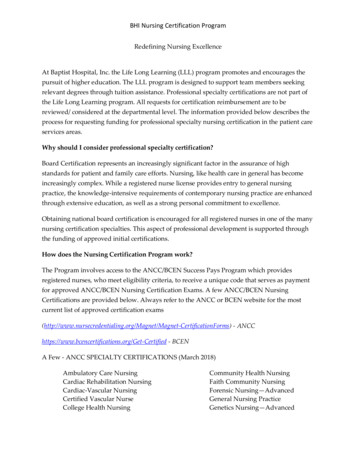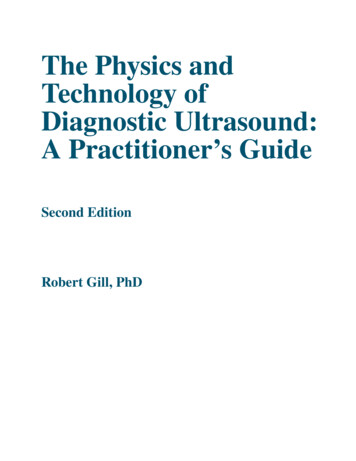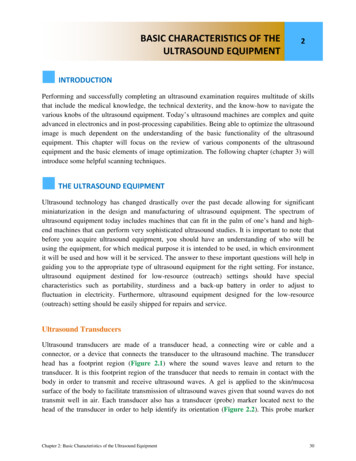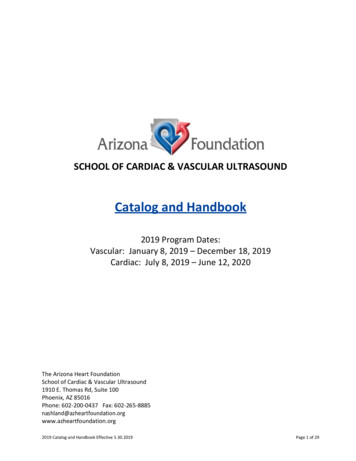
Transcription
SCHOOL OF CARDIAC & VASCULAR ULTRASOUNDCatalog and Handbook2019 Program Dates:Vascular: January 8, 2019 – December 18, 2019Cardiac: July 8, 2019 – June 12, 2020The Arizona Heart FoundationSchool of Cardiac & Vascular Ultrasound1910 E. Thomas Rd, Suite 100Phoenix, AZ 85016Phone: 602‐200-0437 Fax: azheartfoundation.org2019 Catalog and Handbook Effective 5.30.2019Page 1 of 29
Table of ContentsGENERAL INFORMATION . 4History and Ownership . 4Mission . 4Facilities . 4Student Services . 4License . 5Accreditation . 5Registries . 5Employment . 5Catalog . 5GOVERNING BODY . 5Board of Trustees. 5Advisory Board Directors . 6Advisory Board Members . 6Officials and Faculty . 7Management and Administrative Staff . 7PROGRAMS OFFERED . 8Cardiac and Vascular Ultrasound. 8Curriculum . 8Admission . 8Tuition and Costs . 8Fees and Enrollment Documentation . 9Additional Expenses. 9Dress Code . 9CANCELLATION AND REFUNDS . 9Denial of Admission or Enrollment . 9Three-day Cancellation . 9Withdrawal Before Commencement of Program . 9Withdrawal After Commencement of Program . 10Tuition Refund Schedule . 10Tuition Refund Policy for Students Using Veteran Education Benefits . 10Equipment, Books and Supplies . 10Holder in Due Course Statement . 10ATTENDANCE . 11AMERICANS WITH DISABILITIES (ADA) POLICY . 11ADA GRIEVANCE PROCEDURE . 12NON-DISCRIMINATION AND ANTI-HARRASSMENT POLICY . 12CODE OF CONDUCT . 13Illegal Drugs and Alcohol . 14Return of Property . 14Notification of Expulsion . 14GRIEVANCE PROCEDURE. 14STANDARDS OF ACADEMIC PERFORMANCE . 15Academic Progress Records . 15Completion of Program . 16Requirements for Graduation. 162019 Catalog and Handbook Effective 5.30.2019Page 2 of 29
CARDIAC PROGRAM . 17Credentialing . 17Description. 17Goals and Objectives . 17Outcomes . 17Clock Hours . 18Daily Schedule . 18CARDIAC COURSE DESCRIPTIONS . 19Patient Care . 19Physics . 19Introduction to Echocardiography . 19Advanced Echocardiography . 19Imaging Skills Lab . 19Clinical Rotation . 19CARDIAC 2019-2020 CALENDAR . 20CARDIAC CLINICAL SITE OVERVIEW . 20Student Responsibilities . 20General . 21Behavioral and Social . 21Technical . 21Clinical Site Preceptor . 22Cardiac Sonography Student – Master List of Competencies. 22Patient Care Duties Not to be Provided by Students. 22VASCULAR PROGRAM . 23Credentialing . 23Description. 23Goals and Objectives . 23Outcomes . 23Clock Hours . 24Daily Schedule . 24VASCULAR COURSE DESCRIPTIONS . 25Patient Care . 25Physics . 25Introduction to Vascular Ultrasound . 25Advanced Vascular Ultrasound . 25Imaging Skills Lab . 25Clinical Rotation . 25VASCULAR 2019 CALENDAR . 26VASCULAR CLINICAL SITE OVERVIEW . 26Student Responsibilities . 26General . 27Behavioral and Social . 27Technical . 27Clinical Site Preceptor . 27Vascular Sonography Student – Master List of Competencies . 28Patient Care Duties Not to be Provided by Students. 28ACKNOWLEDGMENT OF RECEIPT OF PROGRAM CATALOG AND HANDBOOK . 292019 Catalog and Handbook Effective 5.30.2019Page 3 of 29
GENERAL INFORMATIONHistory and OwnershipThe Arizona Heart Foundation was established in 1971 by Edward B. Diethrich, MD, aninternationally‐renowned cardiovascular surgeon, to develop and support research and educationprograms.Dr. Diethrich established the Arizona Heart Foundation School of Cardiac Ultrasound in 1982; it was one ofthe first programs in the United States dedicated to the development of tomorrow's sonographers. Theprogram has evolved to include the ever-changing field of vascular sonography and is now known as theArizona Heart Foundation School of Cardiac & Vascular Ultrasound.Comprehensive 12-month programs in cardiac and vascular ultrasound are offered once a year andinclude classroom instruction, extensive hands-on scanning experience and clinical rotations. Theprograms are designed for individuals currently working in the field of ultrasound or who are consideringentering the profession. Our faculty's expertise, coupled with small class sizes, not only prepares ourstudents for the national registry exams, but also results in graduates with a discernible difference. Morethan 500 highly-qualified sonographers have graduated from the program. Our graduates provide qualitypatient care, possess leadership positions in their profession, and dedicate themselves as life-longlearners.Throughout the past forty-five years the Foundation has prioritized educational programs focusing onheart disease. In addition to the ultrasound programs the Foundation has provided education forcardiovascular nurse specialists, vascular surgeons and cardiologists, fellows, pre-med college students; aswell as free programs for the local community.MissionThe mission of the school is to prepare graduates with a complete educational experience to become acardiac or vascular professional sonographer. The program provides each student opportunities to learnand develop communication skills, critical thinking and technical skills that adapt to changing technologiesin sonography, professional development, and interpersonal skills. The school enhances academicintegrity and acceptable professional behavior with skills necessary to perform in the healthcareenvironment as a Registered Cardiac Sonographer (RCS) or Registered Vascular Sonographer (RVS).FacilitiesCentrally located in Phoenix, Arizona, the Arizona Heart Foundation building consists of over 30,000 sq. ft.and houses the School and its administrative offices, onsite catheterization labs, physician offices, and alarge classroom with state‐of‐the‐art audiovisual capabilities. The School maintains a student library andcomputer lab, dedicated entrance and free parking. A student lounge has a refrigerator, sink andmicrowave.Student ServicesThe School is committed to providing services to students to aid in the development of their academic,personal and professional goals. Students are encouraged to meet with faculty, exchange ideas, and be apart of our advisory boards. Our library is available five days a week and includes books and publications,a place for quiet study time, computers, printer, and internet access. Computer desktops have shortcutsto societies as well as learning and job placement websites. A job posting board is updated regularly.Students are encouraged to take advantage of open lab times. Hours are posted weekly and students canattend as often as they wish, individually or in study groups.Information as to appropriate resume preparation and the development of interview skills are provided.2019 Catalog and Handbook Effective 5.30.2019Page 4 of 29
LicenseThe School is licensed by the State of Arizona State Board for Private Postsecondary Education for Cardiac& Vascular Ultrasound. The mission of the state agency is to “To protect the health, safety and welfare ofArizona citizens by regulating private postsecondary educational institutions and providing services totheir students.” (www.azppse.gov).AccreditationThe programs are not accredited by a nationally‐recognized accrediting association.RegistriesAll registries are independent agencies and qualifications for taking registry examinations are subject tochange. Applicants should research the American Registry of Diagnostic Medical Sonography,(ARDMS.org) and/or Cardiac Credentialing International (CCI.org) for specific qualifications.EmploymentThe School does not guarantee job placement to graduates upon program completion or graduation.CatalogAll statements in this Catalog reflect the approved policies of the School that were in effect at the time ofpublication. However, the School reserves the right to supplement, change, suspend, or cancel any of theprovisions, statements, policies, curricula, procedures, schedules, or fees at any time. The School willpublish such changes, suspensions, or cancellations as soon as reasonably practicable.GOVERNING BODYArizona Heart Foundation Board of TrusteesOfficersMembersDonald Reid, MDWishaw Hospital, ScotlandMedical DirectorDawna L. Cato, RN, PhDPaula Banahan, RN, BSN, CVNSArizona Heart FoundationPresident and CEOPhil HotchkissJoel Rainwater, MDComprehensive Interventional Care CentersSecretaryMichael GallaugherLynne JacksonAdam TurnerErik VerrydenSean KerriganArizona Heart FoundationChief Financial Officer2019 Catalog and Handbook Effective 5.30.2019Page 5 of 29
School of Cardiac & Vascular Ultrasound Advisory Board DirectorsZaki Lababidi, MDDr. Lababidi is an interventional cardiologist and founderCardiac Program Medical Directorof Gilbert Cardiology. He received his MD fromDamascus University School of Medicine in 1985 andcompleted his fellowship at Marshall University. Dr.Lababidi is the medical director of the cardiac ultrasoundprogram and serves on the cardiac advisory board.Joel Rainwater, MDVascular Program Medical DirectorDr. Rainwater is an interventional radiologist and chiefmedical officer at Comprehensive Interventional CareCenters in multiple cities throughout Arizona. Hereceived his MD from the University of TexasSouthwestern and completed his fellowship at MDAnderson and Duke University. Dr. Rainwater is themedical director of the vascular ultrasound program andserves on the vascular advisory board.School of Cardiac & Vascular Ultrasound Advisory Board MembersCardiacVascularKanaan Abow Alkhier, RPVI, RCS, RVSKanaan Abow Alkhier, RPVI, RCS, RVSNancy AshlandNancy AshlandTracy Baginski, RCSPaula Banahan, RN, BSN, CVNSPaula Banahan, RN, BSN, CVNSKelly Gardner, BS, RDCS (AE, PE), RVTHarry Daughenbaugh, RDCS, RVTSean KerriganKyle HajekFaith KnutsonJason Kendrick, BA, RDCS,(AE), RVTJay Shafer, BS, RVT, RVSSean KerriganGail Size, BS, RPhS, RVS, RVTGail Size, BS, RPhS, RVS, RVTMalka Stromer, M.Ed, BSc., RDMS, CRGSMalka Stromer, M.Ed. BSc. RDMS, CRGSSchool of Cardiac & Vascular Ultrasound Officials and FacultyPaula Banahan, RN, BSN, CVNSMs. Banahan graduated magna cum laude with aExecutive DirectorBachelor of Science Degree from Boston College SchoolFull-time Employeeof Nursing and earned her Cardiovascular NurseSpecialist Certification from the Arizona Heart Institute.Paula has been in the healthcare industry for over 40years and has held several nursing leadership andadministrative positions. She developed Arizona’s firstheart and heart-lung transplant program and laterbecame the executive director of the Arizona HeartInstitute.2019 Catalog and Handbook Effective 5.30.2019Page 6 of 29
Jason Kendrick, BA, RDCS (AE) RVTChair, Cardiac Ultrasound Program andDevelopmentFull-time EmployeeMr. Kendrick graduated from the University of Oregonand is currently enrolled in Capella University workingtoward his MBA with an MHA focus. A graduate ofArizona Heart Foundation’s School of Cardiac & VascularUltrasound, he has been with Banner Hospitals and thePhoenix Indian Medical Center for the past four years.During his time as a high school teacher, Mr. Kendrickdesigned and implemented a new curriculum for science,health, and PE to be used as an experiential educationmodel.Malka Stromer, M.Ed, BSc., RDMS, CRGSClinical CoordinatorPart-time EmployeeMs. Stromer earned her Bachelor of Science Degree andMaster’s of Education from York University in Toronto,Canada. She has spent the past 13 years of her career asa professor, first at Mohawk College and then atGateway Community College. She has authored achapter in a sonography text, won a research awardthrough the SDMS, and most recently earned the Johnand Suanne Rouche Excellence Award through theLeague for Innovation in the Community Colleges.Gail Size, BS, RPhS, RVS, RVT, FSVUDirector of Accreditation andProgram DevelopmentFull-time EmployeeMs. Size earned her Bachelor of Science Degree from St.Mary-of-the-Woods College in 1979 and has over 30years of technical and managerial experience in bothclinical and private vascular laboratories. She is thefounder and president of Inside Ultrasound, Inc. Ms. Sizehas authored numerous publications, including theVascular Reference Guide and Venous Reference Guide.She has given multiple presentations nationally andinternationally and is on the board of trustees ofCardiovascular Credentialing International.School of Cardiac & Vascular Ultrasound Management and Administrative StaffPaula Banahan, RN, BSN, CVNSNancy AshlandExecutive DirectorDirector of Campus AdministrationSean KerriganChief Financial Officer2019 Catalog and Handbook Effective 5.30.2019Tony FornerManager, Support ServicesPage 7 of 29
PROGRAMS OFFEREDCardiac and Vascular UltrasoundPrograms are 51 weeks, include 1,676 clock hours and are offered once a year. All courses are held inperson at the School except for clinical externships. Daily attendance is mandatory. Students mustparticipate in all components of the program, including reporting to clinical sites as assigned. The Schoolwill inquire about each applicant‘s previous education and/or experiential learning, and requesttranscripts from all prior institutions, including military training, traditional college coursework andvocational training. Previous transcripts will be evaluated and credit will be granted if appropriate.CurriculumThe School follows the National Education Curriculum Common Curricula and its Specialty Curricula forCardiac and Vascular Technology. The National Education Curriculum for Diagnostic Ultrasound can befound on all societal and the CAAHEP websites.AdmissionThe School provides access and equal opportunity to all qualified individuals who apply. Applicants mustsubmit a completed application form, two letters of reference, any transcripts or health care certificates;must be at least 18 years of age and hold at least a high school diploma or GED. It is preferable, but notrequired, that applicants have an associate’s or bachelor’s degree or certificate in a patient/health carerelated field (examples include: EMT, paramedic, surgical technologist). Every application is reviewed on anindividual basis.The School does not accept federal financial aid or participate in the “Ability to Benefit” (ATB) provision inthe Higher Education Act (HEA).Applicants desiring to complete the clinical component of a program out of state must secure their ownclinical site.Applicants must be able to meet the physical demands required of a medical professional which include butare not limited to lifting or turning patients, standing for extended periods of time, overhead stretching,bending, pushing, or pulling as needed.Tuition and CostsTuitionRegistration Fee 28,800 150Books/SuppliesRegistry Exam FeeIncludedIncluded (one time only)The School offers two (2) options for tuition payments:(1) Pay in-full, 30 days prior to your program start date and receive 3,000 off the tuition cost shownabove; payments can be made by cash or check, credit card, or a combination of two or more of theseoptions.(2) Obtain a student loan prior to your program start date for the above tuition cost and registration fee(if necessary) through the School’s tuition financing partner, Meritize. Students will work directly withMeritize and can begin the application process by going to https://apply.meritize.comThese options are available to all students. If you are a veteran, you may also be eligible for assistancefrom the U.S. Department of Veterans Affairs. Please contact Sean Kerrigan (602-744-3445 orskerrigan@azheartfoundation.org) with any specific questions regarding tuition payments or for moreinformation regarding Meritize.Accepted applicants are notified and receive a packet including an enrollment agreement and informationconcerning required documentation and immunizations. Accepted applicants are then referred to as“Students”.2019 Catalog and Handbook Effective 5.30.2019Page 8 of 29
Fees and Enrollment DocumentationUpon acceptance to a program and no later than two months prior to the program start date, Studentsmust submit the following:(3) Registration fee of 150.00(4) Signed Acknowledgement of Receipt of School Catalog and Handbook(5) Signed Enrollment AgreementAdditional ExpensesEnrollment is contingent upo
SCHOOL OF CARDIAC & VASCULAR ULTRASOUND Catalog and Handbook 2019 Program Dates: Vascular: January 8, 2019 – December 18, 2019 Cardiac: July 8, 2019 – June 12, 2020 The Arizona Heart Foundation School of Cardiac & Vascular Ultrasound 1910 E. Thomas Rd, Suite 10

